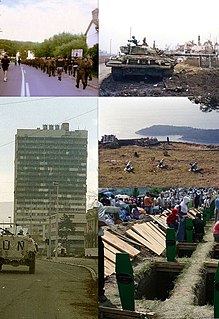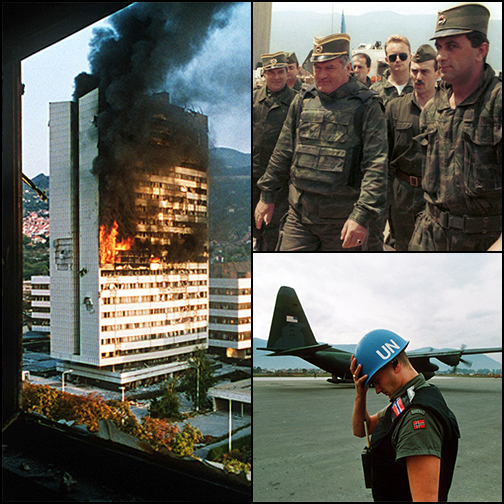Related Research Articles

Bosnia and Herzegovina, sometimes referred to simply as Bosnia, is a country in Southeast Europe on the Balkan Peninsula. It has had permanent settlement since the Neolithic Age. By the early historical period it was inhabited by Illyrians and Celts. Christianity arrived in the 1st century, and by the 4th century the area became part of the Western Roman Empire. Germanic tribes invaded soon after, followed by Slavs in the 6th Century. In 1136, Béla II of Hungary invaded Bosnia and created the title "Ban of Bosnia" as an honorary title for his son Ladislaus II of Hungary. During this time, Bosnia became virtually autonomous, and was eventually proclaimed a kingdom in 1377. The Ottoman Empire followed in 1463 and lasted over 400 years. They wrought great changes to the political and administrative system, introduced land reforms, and class and religious distinctions. A series of uprisings began 1831, which culminated in the Herzegovinian rebellion, a widespread peasant uprising, in 1875. The conflict eventually forced the Ottomans to cede administration of the country to Austria-Hungary through the Treaty of Berlin in 1878. The establishment of the Kingdom of Yugoslavia in 1929 brought the redrawing of administrative regions into the Kingdom of Yugoslavia which purposely avoided all historical and ethnic lines, and removed any trace of Bosnian identity. The kingdom of Yugoslavia was conquered by Axis forces in World War II, and Bosnia was ceded to the Independent State of Croatia (NDH), which led to widespread persecution and genocide. Three years of war began in 1992 which caused around 100,000 deaths and 2 million refugees.

The Yugoslav Wars were a series of separate but related ethnic conflicts, wars of independence, and insurgencies that took place in the SFR Yugoslavia from 1991 to 2001. The conflicts both led up to and resulted from the breakup of Yugoslavia, which began in mid-1991, into six independent countries matching the six entities known as republics which previously composed Yugoslavia: Slovenia, Croatia, Bosnia and Herzegovina, Montenegro, Serbia, and North Macedonia. Yugoslavia's constituent republics declared independence due to unresolved tensions between ethnic minorities in the new countries, which fuelled the wars. While most of the conflicts ended through peace accords that involved full international recognition of new states, they resulted in a massive loss of life as well as severe economic damage to the region.

The Bosnian War was an international armed conflict that took place in Bosnia and Herzegovina between 1992 and 1995. The war is commonly seen as having started on 6 April 1992, following a number of earlier violent incidents. The war ended on 14 December 1995 when the Dayton accords were signed. The main belligerents were the forces of the Republic of Bosnia and Herzegovina and those of Herzeg-Bosnia and Republika Srpska, proto-states led and supplied by Croatia and Serbia, respectively.

Vjekoslav Luburić was a Croatian Ustaše official who headed the system of concentration camps in the Independent State of Croatia (NDH) during much of World War II. Luburić also personally oversaw and spearheaded the contemporaneous genocides of Serbs, Jews and Roma in the NDH.

Greater Croatia is a term applied to certain currents within Croatian nationalism. In one sense, it refers to the territorial scope of the Croatian people, emphasising the ethnicity of those Croats living outside Croatia. In the political sense, though, the term refers to an irredentist belief in the equivalence between the territorial scope of the Croatian people and that of the Croatian state.

The Genocide of Serbs in the Independent State of Croatia was the systematic persecution of Serbs which was committed during World War II by the fascist Ustaše regime in the Nazi German puppet state known as the Independent State of Croatia between 1941 and 1945. It was carried out through executions in death camps, as well as through mass murder, ethnic cleansing, deportations, forced conversions, and war rape. This genocide was simultaneously carried out with the Holocaust in the NDH as well as the genocide of Roma, by combining Nazi racial policies with the ultimate goal of creating an ethnically pure Greater Croatia.

Gideon Greif is an Israeli historian who specializes in the history of the Holocaust, especially the history of the Auschwitz concentration camp and particularly the Sonderkommando in Auschwitz. He served as a visiting lecturer for Jewish and Israeli History at the Schusterman Center for Jewish Studies at the University of Texas at Austin during the academic year 2011–2012. He headed a commission that issued a controversial report in July 2021 that denied that the killing of Bosnian Muslims at and around Srebrenica in July 1995 constituted genocide.
Emir Suljagić is a Bosnian journalist and politician who is currently the Director of the Srebrenica Genocide Memorial. He served as Minister of Education of Sarajevo Canton from 13 January 2011 until 29 February 2012 and was also Deputy minister of Defense from 31 March 2015 to 10 December 2015.
Siniša Malešević, MRIA, MAE is an Irish scholar who is Full Professor/Chair of Sociology at the University College, Dublin, Ireland. He is also a Senior Fellow and Associate Researcher at Conservatoire national des arts et métiers (CNAM), Paris, France.
Garavice was an extermination location established by the Independent State of Croatia (NDH) during World War II in Yugoslavia near Bihać, west Bosnia. Between 12,000 and 15,000 people, mostly Serb civilians, were murdered at Garavice by the Ustasha regime in 1941.

Milorad Ekmečić was a Yugoslav and Serbian historian. During World War II he became a member of the Yugoslav Partisans after the fascist Ustaše perpetrated the Prebilovci massacre, in which 78 members of his family were killed, including his father. He studied at the University of Zagreb and went on to be a professor at the University of Sarajevo, and later at the University of Belgrade. He was a member of several Yugoslav academies of sciences and arts, the author of more than a dozen historical books, and received several significant national awards. Ekmečić authored several important works in socialist Yugoslavia, including his contribution to the acclaimed History of Yugoslavia published in English in 1974, and Stvaranje Jugoslavije 1790–1918 [Creation of Yugoslavia 1790–1918] in 1989.
The Laura Shannon Prize in Contemporary European Studies is a $10,000 book prize sponsored by the Nanovic Institute for European Studies at the University of Notre Dame. The Laura Shannon Prize is awarded annually to the author of the "best book in European studies that transcends a focus on any one country, state, or people to stimulate new ways of thinking about contemporary Europe as a whole." "Contemporary" is construed broadly, and books about particular countries or regions have done well in the process so long as there are implications for the remainder of Europe. The prize alternates between the humanities and history/social sciences. Nominations are typically due at the end of January each year and may be made by either authors or publishers. The final jury selects one book as the winner each year and has the discretion to award honorable mentions.
The Schutzkorps was an auxiliary volunteer militia established by Austro-Hungarian authorities in the newly annexed province of Bosnia and Herzegovina to track down Bosnian Serb opposition, while its main victims were civilians. Officially, they were an auxiliary gendarmerie, while in reality, they conducted illegal and repressive activities. It predominantly drew recruits from members of the Bosniak population and it became infamous as a result of its heavy involvement in the persecution of the Serbs. They particularly targeted Serb populated areas of eastern Bosnia.

Serbian historiography refers to the historiography of the Serb people since the founding of Serbian statehood. The development can be divided into four main stages: traditional historiography, Ruvarac's critical school, Communist–Marxist legacy, and the renewed Serbian national movement.

Florian Bieber is a Luxembourgian political scientist, historian and professor working on inter-ethnic relations, ethnic conflict and nationalism, focusing primarily on Balkans.

Hieromartyr Platon, Bishop of Banja Luka was a Serbian Orthodox cleric who served as the Bishop of Banja Luka between 1940 and 1941. His tenure ended in May 1941, when he was abducted, tortured and killed by followers of the Ustaše movement.
The Boričevac massacre was the massacre of Croat civilians in the village of Boričevac, committed by Serb rebels on 2 August 1941, during the Srb uprising.
The Brotnja massacre was the massacre of Croat civilians in the village of Brotnja, committed by Serb rebels on 27 July 1941, during the Srb and Drvar uprisings.
Miroslav "Miro" Matijević was a Ustaše Militia commander during World War II. Matijević commanded a local unit, based in the Kulen Vakuf region of north-western Bosnia from 1941 to 1945.
Alexander Martin Korb is a German historian specialising in the Holocaust, Genocide, anti-Semitism and related mass crimes in Central and Eastern Europe. Since 2010 Korb has been Lecturer in Modern European History at the University of Leicester. From 2012 until 2018 he was director of the Stanley Burton Centre for Holocaust Studies.